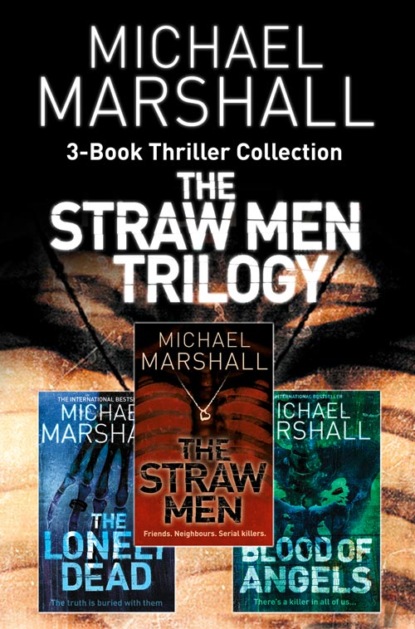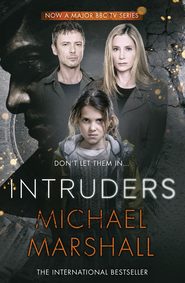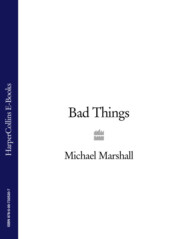По всем вопросам обращайтесь на: info@litportal.ru
(©) 2003-2024.
✖
The Straw Men 3-Book Thriller Collection: The Straw Men, The Lonely Dead, Blood of Angels
Настройки чтения
Размер шрифта
Высота строк
Поля
‘Any more?’ Bobby said. ‘After you?’
‘No. Any at all.’
Chapter 25 (#ulink_8b4ce0fd-c796-57a0-8695-499140a49633)
They came with us out to the bar. Young Ed wasn’t fulsome in his greeting, and said only that he hadn’t seen the old guy and still had no idea where he might be. He continued to say this even after Zandt had taken him to one side. I couldn’t hear what the ex-cop was saying, but Ed’s body language was enough to convince me that Zandt’s conversational style was compelling.
‘Your man is very keen to catch this killer,’ I observed to Nina.
She looked away. ‘You have no idea.’
Zandt eventually turned from the barman, who quickly slipped back behind the safety of his counter.
‘We’re wasting our time out here,’ Zandt said, as we followed him back out into the parking lot. ‘No offence to you guys, but I don’t see how an old wino is going to help Nina and me in what we’re looking for. Maybe it’s relevant to you, but it’s not getting us any closer to anything and Sarah is getting closer to death with every minute we waste.’
‘So what do you want to do, John?’ the woman asked. ‘Head back to LA and sit on our butts there instead?’
‘Yeah,’ he said. ‘Actually that’s exactly what I want to do. I wasn’t just pulling my wire at your house. I think …’ He shook his head.
She frowned. ‘What?’
‘I’ll tell you on the plane,’ he muttered.
‘Hey,’ I said. ‘I’ll give you a little privacy.’
I walked away from them to where Bobby was standing, near to our car. ‘Think the party’s going to break up,’ I said.
‘So what’s our plan?’
‘Walk the streets, check the bars and diners and library and places where people hang out. Do it professionally. This isn’t New York. There’s a limit to how many places he can hide.’
‘You knew this guy once. You got no clue where he might go?’
‘I didn’t really know him,’ I said, turning to look back at the bar. ‘I went in there and drank as a teenager. We passed the time of day and he served me alcohol. That’s all.’
I remembered once again the evening my father had come to the bar with me, and the way Ed had given me a beer afterward, and I’d felt a little disloyal. I now realized there could have been some subtext in that night’s events, something I’d missed back then. The beer Ed shoved toward me, with rough kindness – it could have just been a generic gesture, but I didn’t think so now. Lazy Ed hadn’t really been the type. Hadn’t he actually been saying, ‘Yeah, I know what the guy can be like?’ If so, it implied even more strongly that Ed might have been the man running the camera in the first half of the middle section of the video, that he had been the one passed out and used as a candleholder. It also made it even stranger that, confronted with each other over a decade later, they’d given absolutely no indication that they knew each other. Something must have happened in Hunter’s Rock, something that broke up a group of friends; but somehow caused three of them to get together again, a thousand miles away, once again pretending to outsiders that there was nothing between them. Nothing old, anyway, nothing in the past.
Even to me they’d made that pretence, but now it was looking as if that made perfect sense. If my mother couldn’t have children, then who the hell was I?
Behind the bar the sky was opaque, making the trees look jagged and cold. It may have been that, or the smell of the pine on the cold air, that took me back so clearly to that night. Smells can do that, more so even than sights and sounds, as if the oldest parts of our mind, the ones that lock us in time and memory, still navigate through traces of scent.
‘Hang on a minute,’ I said, a faint light coming on in the back of my mind. I shut my eyes, chased the thought down. Something Lazy Ed had been talking about in that year, the kind of project that sounded like the fantasy of a man who wasn’t well known for even keeping his bar surfaces clean.
Finally I got it. ‘There’s somewhere else we could try.’
‘Let’s do it,’ Bobby said.
I looked over to the other two. I could see that in Zandt’s head they were already at the departure gate. The woman looked less certain. I made the decision for them. This was a long shot, and not one I had the time or patience to explain to other people.
‘Good luck,’ I called. Then I got in our car and Bobby and I drove away.
The Lost Pond isn’t lost, of course. It’s about a mile walk into the forest that stretches north from Hunter’s Rock: national land, not much used except by locals and a few hikers. It was a place you’d be taken on trips from school, out into the wilds to learn about bugs and stuff – a bus out to the fringe of the forest, and then a trek among trees through shuffling leaves, pleased to be out of the classroom. The teachers would try to keep everyone’s mind on why they were there, but not too assiduously: you could tell from the looseness in their shoulders that they, too, were happy to be free of the usual boundaries. I remember seeing one of them pick up a small rock once, when he thought none of us was looking, and hurl it some distance at a fallen tree. He hit it, and smiled a private smile. That may have been the first time I realized that – contrary to appearances – teachers must be people, too.
When you got older you weren’t taken out there any more. Lessons became focused on stuff you could memorize, not experience. But occasionally kids would go out there for the hell of it, and this was when the reason for the name would become apparent. Didn’t matter how many times you’d been crocodiled out there with thirty yapping peers, if you tried to find it on your own or with a couple of friends, it never seemed to be where you thought it was. You’d walk into the banks of trees, quietly confident, and within a few hundred yards the track would have disappeared. A small creek ran diagonally away into the small hills, and most people would make it that far. You’d follow the creek until you came to the place where it joined a larger one, and from that point every decision you made would be wrong. Didn’t matter how well you thought you remembered the route, how much you all agreed it had to be this way; a couple hours later you’d be back in the parking lot, thirsty and dog tired and just glad to be out again while it was still light and without having seen any bears.
Except for me. I went to the trouble, one summer when I didn’t have a lot else to do, of learning where the pond was. I would have been fifteen, I think, a couple of years before the night in the bar with my father. I applied scientific method, which I was very impressed with at the time. I methodically worked through all of the route alternatives until I’d found where the pond was – and how to get there. I got very lost a few times, but it wasn’t a bad way of spending a few weeks. When you know where you’re going, a forest is a nice place to be. It feels safe, and you feel special. The problem was, once I’d successfully made the journey maybe ten times, I realized I’d ruined it for myself. There’s no point in a lost pond that isn’t lost. It becomes just a pond, and I stopped going. By that time I was getting more interested in knowing about places to go necking, and you couldn’t get a girl to go walking in the forest after dark – certainly not in search of some patch of water that you might or might not be able to find. That’s not the kind of thing that appeals to most girls. Or I didn’t. One or the other.
Bobby and I were walking in single file, following a tributary of the creek. It had been over twenty years, and the environment had twisted and changed. The cover overhead was patchy, and cold shafts of sun came down to throw shadows.
We soon came to another intersection in the creek network, steep banks where it had cut down deep into the earth. I stopped at the top of one of the banks, momentarily unsure. The area didn’t look familiar. There was some muttering in the ranks.
‘And we’re doing this because the guy said that he was considering putting up a hunting shelter, about … oh, twenty years ago?’
‘You can go home now if you want.’
‘Without my faithful native tracker?’
After another slow look around, I understood the way the vegetation had changed. One of the trees I had used for a marker had fallen down in the intervening years. Some time ago, too: the remains were moss-covered and rotten. I reoriented myself and headed into the gully.
The sides were steep and slick with leaves, and we were careful on the way down. When I reached the bottom I turned left and took us along the slight incline.
‘We’re nearly there,’ I said, pointing up the way. About two hundred yards ahead, the gully banked steeply to the right. ‘I think it’s just around that kink.’
Bobby didn’t say anything, and I assumed that, like me, he’d become absorbed into the experience. Forests are one of those things that you lose for a while, until you have your own kids and start to appreciate certain things again, see them reborn through a child’s eyes – like ice cream and toy cars and squirrels. I spent some time considering if this had something to do with why I liked hotels. Their corridors are like routes between trees, their bars and restaurants like little clearings for assembly and eating. Nests of varying size and prestige, all held within the same structure, a private forest.
The Upright Man’s manifesto had gotten into my head more than I’d realized.
‘Somebody’s watching us,’ Bobby said.
‘Where?’
‘Don’t know,’ he said, glancing up at the sides of the gully above us. ‘But he’s up there somewhere.’
‘I don’t see anyone,’ I said, keeping my eyes forward. ‘But I’ll take your word for it. So what do we do?’
‘Keep walking,’ Bobby said. ‘If it’s him, he’s either going to wig out or stay put and make a decision on whether to come talk. He sticks his head far enough above the parapet, I’ll go after him.’
We covered the last hundred yards quietly, resisting the urge to look up. At the turn in the gully the floor rose sharply, and we scrambled up a couple of feet.
And there, in front of us, was the Lost Pond. Maybe a hundred yards by sixty, steeply banked for the most part, but with a couple of muddy little beaches. A few ducks floated in the middle, and trees overhung much of the shallow water. I walked up to the edge and looked into it. It was like looking in a mirror and seeing myself as I was when I was fifteen.
‘You know where the hide was?’ Bobby asked.
‘All I know is that he was planning one. He mentioned it twice, maybe three times. Not to hunt. Just somewhere to hang. Ed was a bigtime loner.’
‘Plus a pervert, maybe?’
‘No.’ I shook my head. ‘No one comes out here to make out. It’s kind of spooky at night.’







